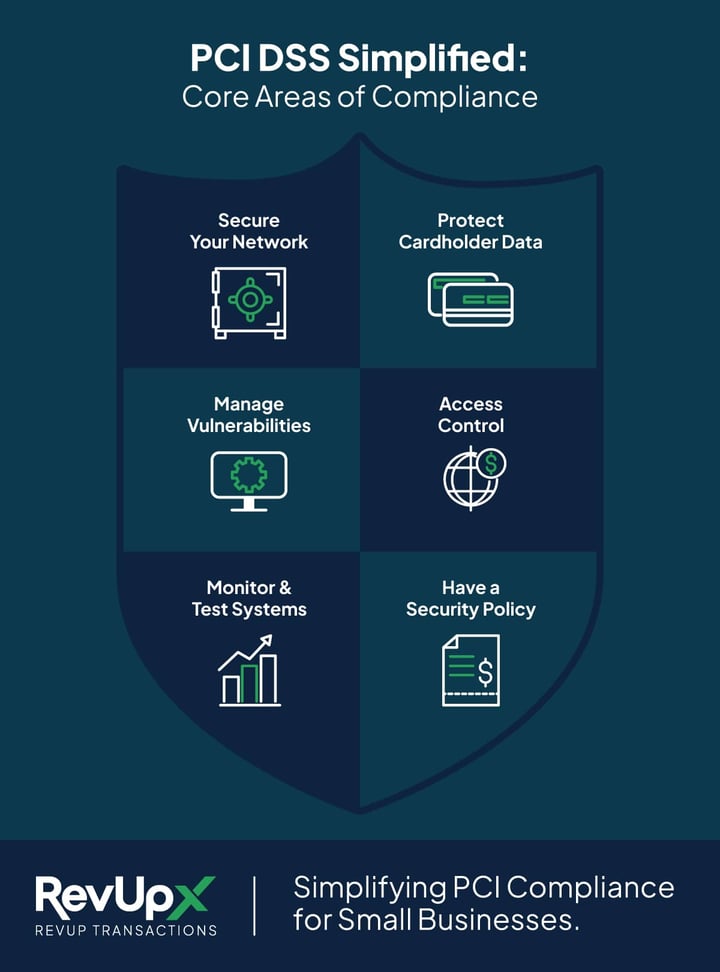Payment security isn’t just a concern for big-box retailers or major e-commerce players. Small businesses are just as vulnerable to payment fraud and data breaches. In fact, attackers often see smaller businesses as “easier targets” because they tend to have fewer security controls in place.
That’s where PCI compliance comes in. The Payment Card Industry Data Security Standard (PCI DSS or PCI) helps businesses protect customer card data and maintain trust, while also shielding themselves from the steep costs of a data breach or non-compliance penalties.
This guide breaks PCI compliance down into simple, actionable steps that any small business can implement with confidence.
Key Takeaways
- PCI compliance protects businesses and their customers. Even small businesses are targets for fraud and data breaches, making PCI DSS a critical safeguard.
- Compliance is scalable and manageable. Whether a business processes a handful of transactions or thousands, the core steps and principles are the same, and relatively easy to implement with the right plan.
- Proactive security builds trust and reduces risk. From encryption to strong passwords and ongoing staff training, smart security practices help prevent breaches and costly penalties.
- Consistency is key. Maintaining compliance year-round through regular audits, documentation, and timely updates helps ensure businesses remain secure and prepared for evolving standards.
- Partner with RevUpX for expertise and support. With proven experience in PCI compliance and payment processing, RevUpX provides the tools, insights, and guidance to protect businesses while optimizing payment operations.
What Is PCI Compliance?
At its core, PCI DSS is a set of security standards designed to protect cardholder data during and after a financial transaction. Established by major credit card brands including Visa, Mastercard, and American Express, the PCI DSS outlines clear guidelines for businesses that accept, process, or store credit card information.
Many small business owners mistakenly think they’re too small to worry about compliance or that their payment processor handles everything. While using a PCI-compliant processor is a big step in the right direction, it doesn’t automatically make your business fully compliant. You’re still responsible for following security best practices to keep your customers一and your business一safe.
Who Needs to Be PCI Compliant
The answer is simple: every business that accepts card payments. Whether you’re running a coffee shop, an auto dealership, an online boutique, or a local service business, PCI compliance applies to you.
The good news? The requirements scale to fit your business. A small business processing a few hundred transactions per month won’t have the same reporting burden as an enterprise-level retailer. However, the core principles of security apply across the board.
Benefits of PCI Compliance for Small Businesses
PCI compliance isn’t just a regulatory requirement; it’s a smart investment in the security and stability of your business. For small businesses, where every transaction and customer relationship counts, compliance offers protection, trust, and peace of mind.
By committing to PCI standards, you’re not only reducing risks but also strengthening the foundation for growth and customer loyalty. Key benefits include:
- Reduced risk of breaches and fraud: Strong security controls make your business a much harder target for cybercriminals, helping you avoid the financial and reputational damage of a data breach.
- Customer trust and loyalty: Clients feel safer knowing their payment data is protected, which builds confidence, repeat business, and referrals.
- Penalty avoidance: Non-compliance fines can quickly reach thousands of dollars per incident, creating a financial burden that can be easily avoided by staying compliant.
- Operational confidence: With the right systems and processes in place, payment security becomes a seamless part of your operations, letting you focus on running and growing your business.
PCI DSS Simplified: Core Areas of Compliance
The official PCI DSS documentation outlines 12 core requirements, which can seem complex at first glance. Here’s a summary version:
- Secure your network: Use firewalls and strong passwords to block unauthorized access.
- Protect cardholder data: Encrypt customer data during transmission and don’t store sensitive information unless necessary.
- Manage vulnerabilities: Keep your POS systems and software up to date and run antivirus programs.
- Access control: Limit access to payment systems to employees who need it.
- Monitor and test systems: Log activity and regularly test your systems to catch weak points.
- Have a security policy: Train your team and establish clear processes for handling data safely.
Think of these requirements as common-sense steps to protect both your customers and your reputation.

How to Navigate PCI Compliance: A Step-by-Step Guide
For most small businesses, PCI compliance can be achieved by following these four practical steps:
1. Determine Your PCI Level
Compliance levels are based on the number of transactions your business processes annually. Most small businesses fall into Levels 3 or 4, which have lighter reporting requirements.
2. Complete the Self-Assessment Questionnaire (SAQ)
The Self-Assessment Questionnaire (SAQ) is a checklist of yes/no questions about your business’s payment security practices. It sounds intimidating, but for small businesses, it’s straightforward and typically takes less than an hour to complete.
3. Identify & Fix Vulnerabilities
Look for easy wins, such as:
- Update old POS systems and software.
- Secure your Wi-Fi with encryption and unique passwords.
- Ensure antivirus and anti-malware tools are active and up to date.
4. Stay Fully Compliant, All Year
Compliance isn’t a one-and-done task. Schedule periodic system checks, keep staff trained on security basics, and document your efforts so you’re prepared if an audit ever arises.
Pro tip: Work with a PCI-compliant payment processor, such as RevUpX. With deep expertise in payment security and compliance, RevUpX not only simplifies the process but also keeps you informed about evolving requirements so you’re never caught off guard.
PCI Compliance: Resources &Tools
- PCI Security Standards Council (PCI SSC): Official information and updates
- PCI Quick Reference Guide A free, easy-to-read summary of the standards
- Merchant resources for small businesses — Start with the PCI SSC Merchant Resources page
Avoid These Common Pitfalls
Even with the best intentions, many small businesses struggle with compliance. Here are some common mistakes and how to avoid them:
- Storing unnecessary cardholder data: Never store sensitive data unless it’s required for business operations.
- Weak passwords and shared logins: Enforce strong, unique passwords for every system user.
- Unsecured networks: Keep customer transactions on a dedicated, encrypted network, separate from guest Wi-Fi.
- Skipping employee training: Your security is only as strong as your least-informed team member. Make training a regular habit.
Take Action: Practical Steps for PCI Compliance
Maintaining PCI compliance doesn’t have to be complicated. By integrating smart security practices into daily operations, you can simplify compliance, reduce risks, and keep customer data protected. Here are some practical steps to stay secure and compliant:
- Partner with a reputable, PCI-compliant payment processor for built-in safeguards.
- Use tokenization and end-to-end encryption to secure transactions.
- Schedule regular security audits and system checks.
- Document compliance procedures and updates to maintain a paper trail for audits.
Taking these steps consistently transforms PCI compliance from a daunting task into a routine part of running a secure and trustworthy business.
Partner With an Expert to Protect Your Business
Managing PCI compliance doesn’t have to be overwhelming, but it does require the right experience and expertise. That’s where RevUpX comes in.
With a deep understanding of PCI standards and years of experience in payment processing, RevUpX helps small businesses navigate compliance with confidence. From built-in security and advanced fraud protection to expert support and consultation, we make sure you have the right foundation to protect your customers and your business.
Ready to simplify PCI compliance? RevUpX helps small businesses protect customer data with built-in safeguards, expert guidance, and zero-stress compliance management.
Contact RevUpX today to learn how our tailored merchant services solutions can protect your business, satisfy compliance requirements, and boost your bottom line.
About RevUpX
RevUpX is a leading merchant services provider specializing in zero-fee credit card processing solutions for various industries.
Through strategic partnerships with industry giants Fiserv and CardConnect, RevUpX delivers customized surcharge and cash discount programs that eliminate processing fees, boost profitability, and enhance financial control for businesses operating on tight margins.
With over 100 years of combined team experience and 24/7/365 dedicated support, RevUpX provides comprehensive payment processing solutions including free Clover POS terminals, CardPointe Gateway virtual terminals, and full regulatory compliance assistance.
From automotive retail to waste management and logistics, RevUpX transforms payment processing challenges into competitive advantages, helping businesses recapture savings while maintaining exceptional customer service.


